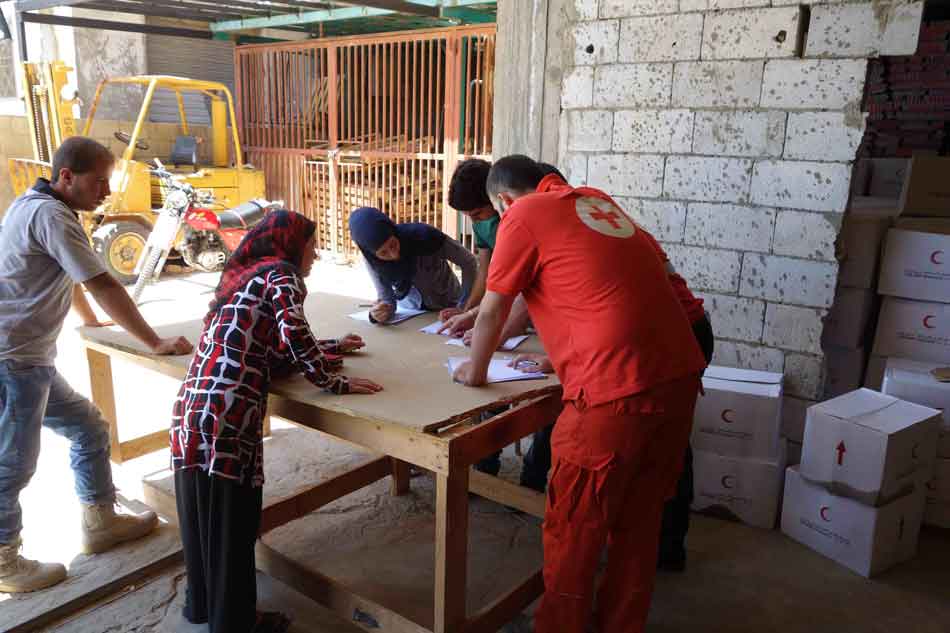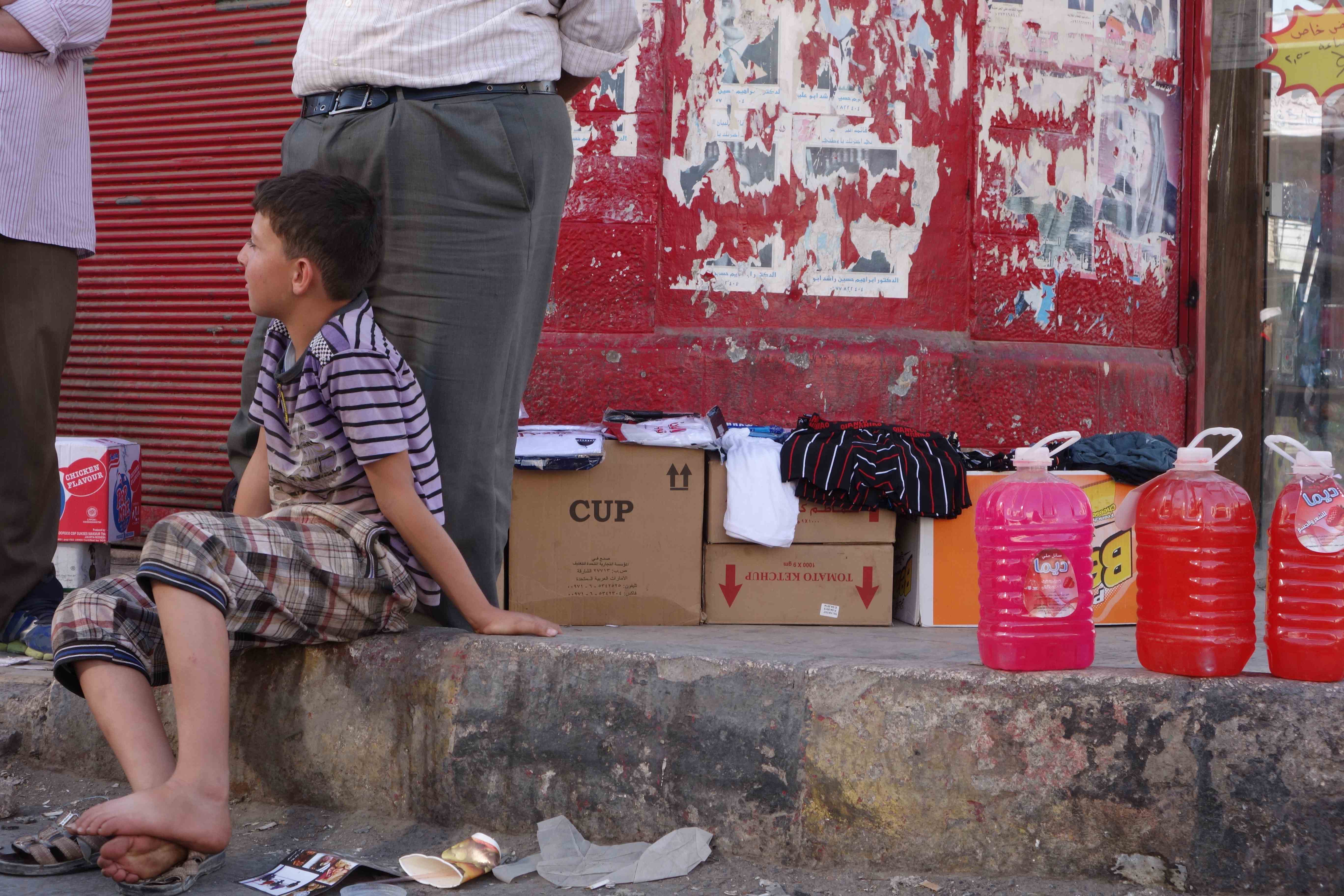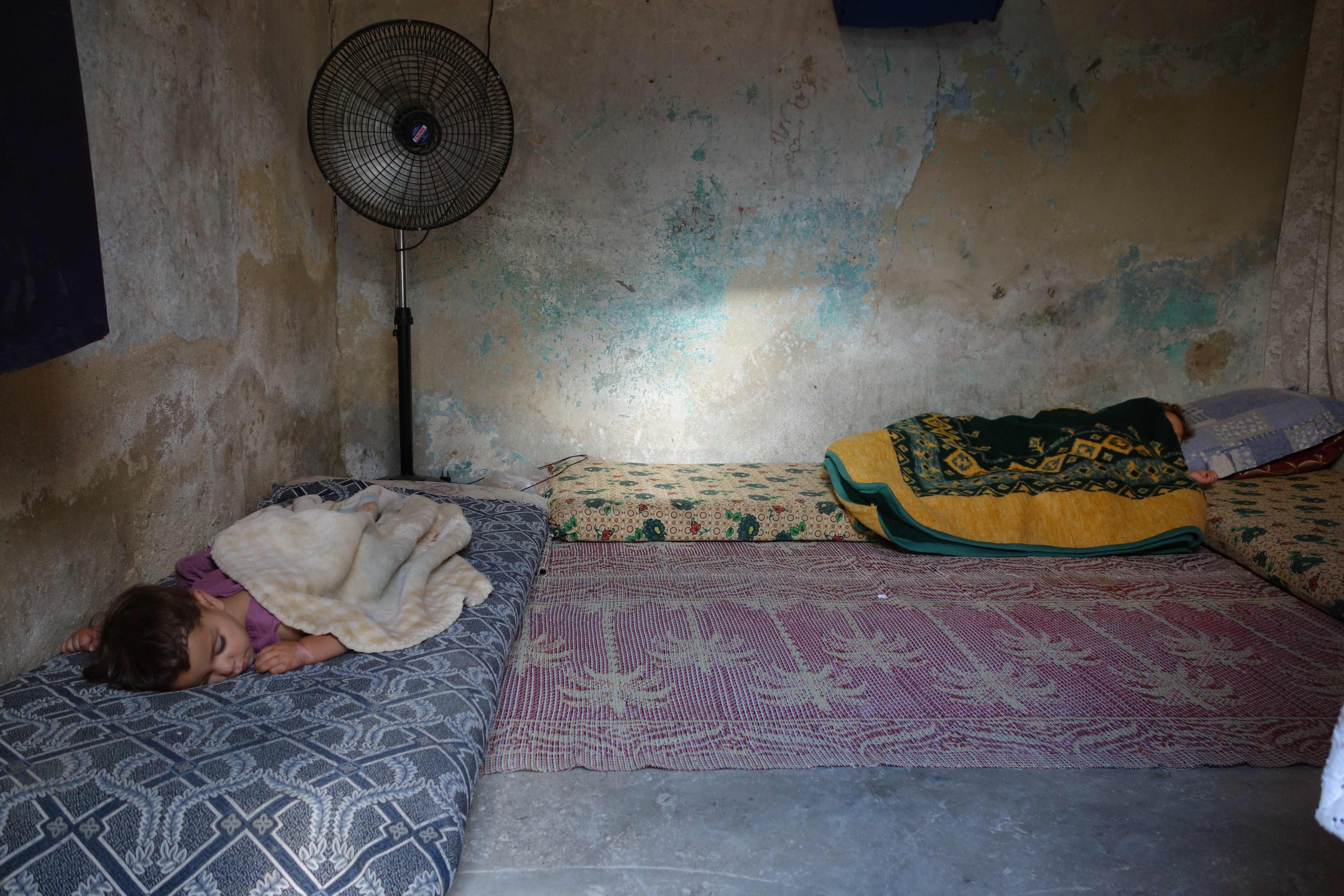
On a hot afternoon in late July, Lebanese aid workers were handing out boxes of food to Syrian exiles in a town just a few kilometers from the Syrian border: on the face of it, an unremarkable event in a war that has forced hundreds of thousands of people to flee to Lebanon. But the town was Hermel, a Hezbollah stronghold in the northernmost part of Lebanon's Bekaa Valley that has sent numerous young men to fight for the Syrian regime. And the food boxes were donated by the Red Crescent of the United Arab Emirates, a Sunni country in the Arabian Gulf that, along with Qatar and Saudi Arabia, has backed the Syrian opposition.
Though little noted, it is one of the more paradoxical consequences of the Syrian conflict: while the war has deeply divided the Middle East, the refugee crisis it has produced is forcing the opposing sides to work together outside Syria's borders—above all in Lebanon, a tiny, fractious country with large Sunni and Shia populations and especially complicated ties to Syria. "It's a big problem," a local man told me during my visit to Hermel. "We have Syrians living alongside our own families here, and the sons of both are meanwhile killing each other in Syria."
Over the past few months, as Hezbollah has very publicly entered the Syrian war, much has been said about how the conflict is spreading to Lebanon. Hermel is just across the border from Qusayr, the strategic Syrian city that Hezbollah fighters, along with Syrian government forces, dramatically conquered in early June. Many Lebanese, including some in neighboring villages, support the Syrian opposition and have been enraged by Hezbollah's readiness to fight for the regime. In June, following Hezbollah's victory in Qusayr, a Lebanese Sunni extremist group engaged in a shootout with Hezbollah fighters and Lebanese military forces in the southern city of Sidon. And on July 9, a large car bomb was detonated in a Hezbollah-controlled area of southern Beirut. Since Qusayr, there have also been an alarming series of attacks and kidnappings by both Sunni and Shia tribes in the area around Hermel.
But the rapid influx of Syrians—who have now settled in almost every part of Lebanon—is challenging the country's sectarian divisions in unexpected ways. At present, the United Nations refugee agency (UNHCR) says there are around 680,000 Syrian refugees in Lebanon; the Lebanese government says that the number of Syrians in its borders, including many who have not registered with UNHCR, is more like 1.2 million, or about a quarter of the entire Lebanese population. And while many fleeing Syrians have gone to communities of their own sect—Christians to Christian villages, Sunnis to Sunni areas—many more have ended up in places where the local population supports the other side.
All of which has made for some challenging situations for the aid community. Take the experience of the Assistance Coordination Unit (ACU), an organization established last winter under the auspices of the Syrian National Coalition, the group representing the Syrian opposition, to channel international aid to Syrians. Although the ACU says its mission is strictly humanitarian, its affiliation with the SNC has meant that the aid it receives comes from countries that have backed the rebels, including the United States, Western European nations, and countries in the Arab Gulf; inside Syria, its aid is directed primarily to rebel-held areas. Moreover, many of these donors, including the US and now the European Union, regard Hezbollah's military wing as a terrorist group.
In Lebanon, however, the lines have become blurred. This summer, the ACU has been trying to distribute $20 million of food vouchers in twenty days to refugee populations across the Bekaa Valley—a Ramadan gift from a Kuwaiti charity. As Wissam Tarif, a coordinator with the ACU's Beirut office, told me, some of this aid is now going to towns under Hezbollah control. "We work very well with those mayors—they have precise lists of the refugees, they are very organized," Tarif said. "I don't care if it's Hezbollah. There are thousands of people we need to reach."
To outside observers, the notion of Hezbollah districts hosting Syrians who support the opposition—and cooperating with opposition-affiliated donors to distribute aid to them—may seem puzzling. But for the militant Shia movement, which has built a loyal following in poor Lebanese communities through its reputation for charity and its ability to provide social services, taking care of Syrians has important political symbolism. Until now, the weak and deeply divided Lebanese government has largely failed to articulate any long-term strategy for dealing with refugees—not least, because of a disagreement between pro-opposition parties, who call for building refugee camps, and Hezbollah and its allies, who say that camps could provide bases for Sunni extremists fighting against the regime. This has meant that Syrians have instead flooded towns and villages across the country, leaving it up to municipalities, including those run by Hezbollah, to deal with them and to get help from international donors.
Already last fall, Hezbollah leaders in Beirut claimed the group was providing aid to Syrians who had fled to Lebanon, regardless of their sectarian background. Over the past few months, Hezbollah has reportedly asked Shia communities in Lebanon to exercise restraint in celebrating Syrian victories, and in recent statements, Hezbollah's leader, Hassan Nasrallah, has urged competing Lebanese factions to "take any side you want" in Syria, but keep the conflict out of Lebanon. More dramatically, during the battle of Qusayr, Lebanese media reported that Hezbollah allowed safe passage to several dozen wounded Syrian opposition fighters so they could be delivered to hospitals in the Bekaa. (Although Red Cross workers told me that ambulances transporting wounded Syrians have sometimes been stoned as they pass through Hezbollah areas.)
"This is what makes it unique," explained Timur Goksel, a former senior advisor to international peacekeeping forces in Southern Lebanon who is based in Beirut and has followed Hezbollah for many years. "When it comes to assistance, everything is allowed, and they cooperate with their enemies."
In Hermel, the mayor told me that Syrians have generally been embraced by the local population because there are longstanding ties on both sides of the border that transcend sectarian background. There also is a sense of special obligation toward Syrians, he said, because Syria took in more than 100,000 Lebanese Shia in 2006 after the Israeli Air Force leveled many Hezbollah villages in south Lebanon in its war with the group. One woman I met, who had fled from the outskirts of Aleppo with eighteen family members, with just the clothes on their back, had come to the Hermel region because her son, who served as a Syrian border guard, knew a Lebanese farmer who gave them a small building to live in. "I had to help them. They had nowhere to go," said the farmer, Mohamad Katari, who was holding a keychain with a picture of Nasrallah on it.
But several Lebanese observers I met doubt that such good will can be sustained. Hezbollah has already blocked international donors from offering aid in some of its districts, claiming it might be a cover for smuggling weapons or opposition fighters into Syria or for attacking Hezbollah at home. And as hostilities between Lebanese Shia and Lebanese Sunni populations grow, the group may have more difficulty reigning in its base. On Friday, two Turkish pilots were kidnapped in Beirut by a Shia militia, apparently in retaliation for Turkey's alleged support of a Sunni group in Syria that is holding hostage a group of Lebanese Shia.
In the northern Bekaa, relations between Hermel and Aarsal, a volatile Sunni town also on the Syrian border, are particularly tense. Just two days before my visit, a member of a prominent Aarsal tribe was kidnapped in broad daylight on the road to Hermel by Shia militants, who said they were seeking revenge for the killing of four Shia near Hermel in June. And on August 11, the mayor of Aarsal was wounded, and two alleged fighters in the al-Nusra front were killed, in an ambush. Indeed, many Syrians I spoke to in and near Hermel were reluctant to talk about religion and said they feared being swept up in local feuds; some indicated they had not registered as refugees with the UNHCR because they thought it might identify them as belonging to the wrong group.
Meanwhile, many of the towns that have received the most refugees are among Lebanon's poorest, and have suffered from the collapse of cross-border trade with Syria. With more Syrians still arriving, local sentiment is rapidly turning against them. Since early summer, several aid groups—and even the UN itself—have been stressing that humanitarian assistance needs to go to Lebanese host communities as much as to the Syrians in their midst. But aid workers say that current levels of aid are far from sufficient even to help the Syrians. Katari, the farmer, said he had brought the Syrian family to Hermel to get the UAE food aid because he was having trouble providing for them. But the family told me that its allotment of two food boxes—aid which is now distributed once a month in Hermel—would probably be only enough to last a few days.
The greater irony is that many of the Syrians who are now putting such a strain on Hezbollah communities—and on Lebanon itself—were forced to flee precisely because of Hezbollah's own involvement in the war. According to the Syrian Red Crescent, tens of thousands of people from Qusayr, a mostly Sunni and Christian city of some 35,000, fled to Lebanon during the battle with Hezbollah in May. The UNHCR predicts that hundreds of thousands more Syrians will follow them between now and December. As one local journalist who has covered Lebanon and Syria for many years suggested to me, no amount of aid to refugees can make up for that exodus—and the brutal military campaign that is now driving it.

Education Resource
Alisa Roth and Hugh Eakin Discuss Reporting on Syria's Refugees
For their project, Syria's Displaced: Regional Implications, Alisa Roth and Hugh Eakin traveled the...






